The Mobile Speech Recognition Software Market is estimated to be valued at USD 6.1 billion in 2025 and is projected to reach USD 46.2 billion by 2035, registering a compound annual growth rate (CAGR) of 22.5% over the forecast period.
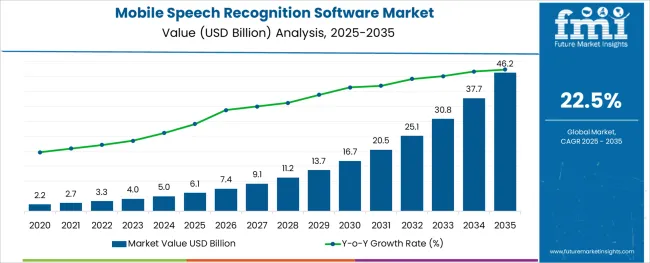
The mobile speech recognition software market is expanding rapidly due to increased demand for hands-free and efficient communication tools across various industries. The healthcare sector is playing a significant role in driving this growth by leveraging speech recognition technologies to improve clinical documentation accuracy and reduce administrative burdens.
Advances in natural language processing and AI have enhanced the accuracy and speed of speech recognition software, making it a valuable tool for healthcare professionals. Additionally, growing adoption of electronic health records and telemedicine has increased the reliance on voice-to-text solutions for real-time data entry and patient interaction.
The convenience and productivity benefits offered by mobile speech recognition are fueling adoption across hospitals, clinics, and remote care settings. With continuous improvements in software capabilities and integration with mobile devices, the market is expected to grow steadily. The healthcare vertical is anticipated to lead demand, reflecting its unique need for efficient and error-free documentation.
The market is segmented by Vertical and region. By Vertical, the market is divided into Healthcare, Military, Automotive, Retail, Government, Education, BFSI, and Others. Regionally, the market is classified into North America, Latin America, Western Europe, Eastern Europe, Balkan & Baltic Countries, Russia & Belarus, Central Asia, East Asia, South Asia & Pacific, and the Middle East & Africa.
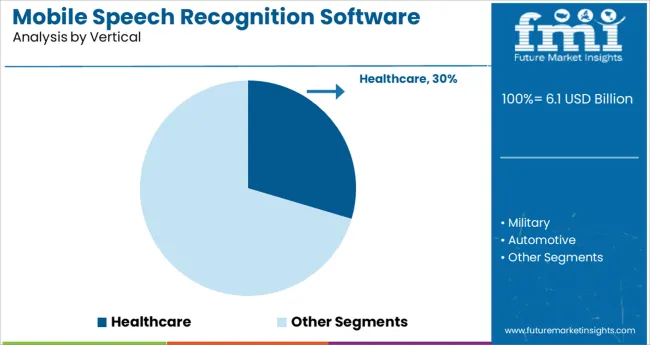
The healthcare segment is projected to account for 29.6% of the mobile speech recognition software market revenue in 2025, maintaining its position as the leading vertical. Growth in this segment is driven by the critical need for accurate and rapid clinical documentation to support patient care and regulatory compliance.
Healthcare providers benefit from speech recognition software that enables faster note-taking, reduces manual entry errors, and improves workflow efficiency. The rise of telehealth and mobile health applications has further increased demand for voice-enabled solutions that facilitate seamless communication between clinicians and patients.
Additionally, healthcare institutions are investing in technologies that enhance data security and privacy, critical factors in adopting speech recognition tools. As the healthcare industry continues to digitize and seek operational efficiencies, the mobile speech recognition software market in this vertical is expected to sustain robust growth.
The crucial requirement of biometric authentication in mobile banking is leading to the intensified integration of speech authentication, thus driving the mobile speech recognition software market trends.
Rising awareness of the multi-functionality of mobile devices in speech recognition technologies is also turning up as another important factor driving the mobile speech recognition software market growth positively.
Lack of accuracy in a noisy working environment is an important restraint faced by most of the vendors in the mobile speech recognition software market size.
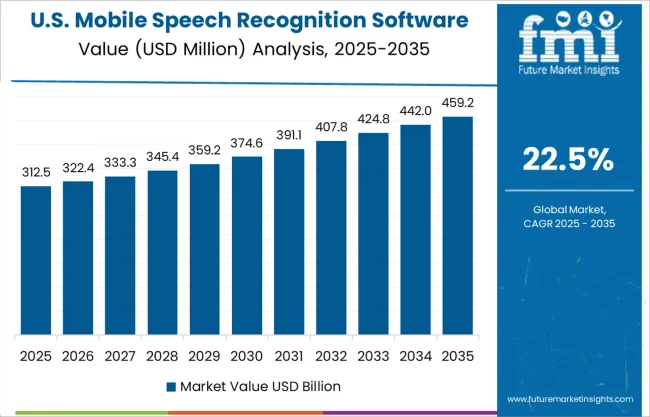
Based on geography, mobile speech recognition software market analysis can be segmented into seven key regions, namely North America, Latin America, Western Europe, Eastern Europe, Asia Pacific excluding Japan, Japan, and Middle East & Africa.
Among various regions, the mobile speech recognition software market size, North America is expected to dominate the market during the forecast period i.e., 2025 to 2035.
The region is anticipated to acquire 30.7% of the global mobile speech recognition software market share, as per the mobile speech recognition software market statistics all around the globe.
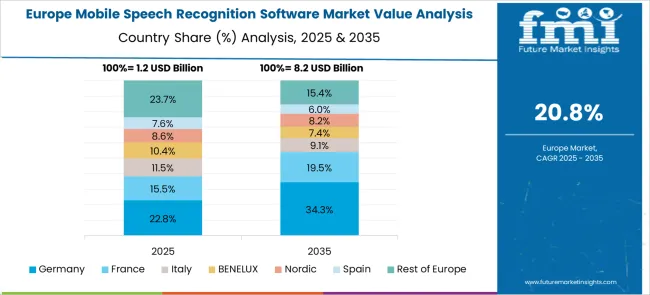
After North America, the Europe region is anticipated to boosting in the mobile speech recognition software market opportunities by acquiring 22.6% of the total share in the mobile speech recognition software market trends & forecasts in the forecast period.
Due to the growing trend of connected devices in automotive and home automation, speech res, and retail sectors in Europe. cognition technologies are anticipated to see more applications in the consumer electronic
Therefore, the adoption of mobile speech recognition software is growing higher in the marketplace.
Low latency algorithms eliminate distracting car noises like traffic noises, radio, and passenger conversations to recognize speech and improve the effectiveness of voice-controlled devices.
Devices that include a speech interface also let users control camera settings verbally. The startup's software works on both iOS and Android devices.
While the interface recognizes multiple participants and uses sentiment analysis to help understand the meeting's overall tone, the API generates summaries and keywords to keep notes organized.
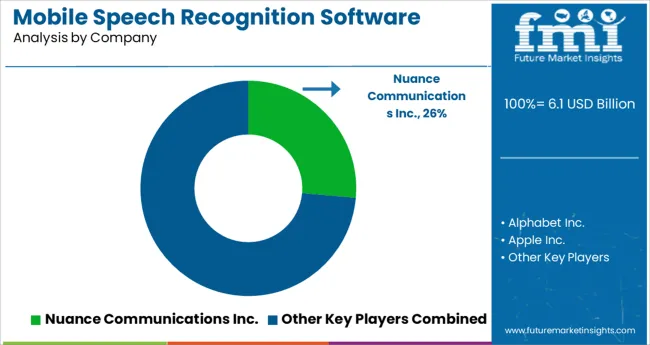
Several key competitor companies are likely to grow and produce more revenue in the mobile speech recognition software market statistics in recent years. They are focused on their plans, policies, and methodologies
They adopt several boosting revenue policies including partnerships, mergers, and acquisitions to lift the mobile speech recognition software market growth during the forecast period from 2025 to 2035.
Some of the dynamic key competitor companies who are always on the front door to keep boosting the mobile speech recognition software market key trends & opportunities are mentioned below.
The major player operating in the mobile speech recognition software market includes Nuance Communications Inc., Alphabet Inc., Apple Inc., Baidu Inc., Amazon Inc., Microsoft Corporation, VoiceBox Technologies Corporation, LumenVox, LLC., Pareteum Corporation, Sensory, Inc. ReadSpeaker Holding B.V., and VoiceVault Inc. among others.
These industries are contributing a huge role in th adoption of mobile speech recognition software all around the regions during the forecast period from 2025 to 2035.
In October 2020, VoiceVault Inc. partnered with BioConnect based in the USA to develop and integrate biometric authentication into finance platforms and digital banking. The main objective of this partnership was to enable the integration of VoiceVault Inc.'s existing voice recognition software with the BioConnect mobile platform to offer biometric authentication solutions with eye scanning technology and voice.
| Report Attribute | Details |
|---|---|
| Growth Rate | CAGR of 22.5% from 2025 to 2035 |
| Base Year for Estimation | 2024 |
| Historical Data | 2020 to 2024 |
| Forecast Period | 2025 to 2035 |
| Quantitative Units | Revenue in million and CAGR from 2025 to 2035 |
| Report Coverage | Revenue Forecast, Volume Forecast, Company Ranking, Competitive Landscape, Growth Factors, Trends, and Pricing Analysis |
| Segments Covered |
Vertical, Region |
| Regions Covered |
North America; Latin America; Europe; East Asia; South Asia; Oceania; Middle East and Africa |
| Key Countries Profiled | USA, Canada, Brazil, Argentina, Germany, United Kingdom, France, Spain, Italy, Nordics, BENELUX, Australia & New Zealand, China, India, ASIAN, GCC Countries, South Africa |
| Key Companies Profiled |
Nuance Communications Inc; Alphabet Inc; Apple Inc; Baidu Inc; Amazon Inc; Microsoft Corporation; VoiceBox Technologies Corporation; LumenVox, LLC; Pareteum Corporation, Sensory; ReadSpeaker Holding B.V.; VoiceVault Inc. |
| Customization | Available Upon Request |
The global mobile speech recognition software market is estimated to be valued at USD 6.1 billion in 2025.
It is projected to reach USD 46.2 billion by 2035.
The market is expected to grow at a 22.5% CAGR between 2025 and 2035.
The key product types are healthcare, military, automotive, retail, government, education, bfsi and others.
segment is expected to dominate with a 0.0% industry share in 2025.






Our Research Products

The "Full Research Suite" delivers actionable market intel, deep dives on markets or technologies, so clients act faster, cut risk, and unlock growth.

The Leaderboard benchmarks and ranks top vendors, classifying them as Established Leaders, Leading Challengers, or Disruptors & Challengers.

Locates where complements amplify value and substitutes erode it, forecasting net impact by horizon

We deliver granular, decision-grade intel: market sizing, 5-year forecasts, pricing, adoption, usage, revenue, and operational KPIs—plus competitor tracking, regulation, and value chains—across 60 countries broadly.

Spot the shifts before they hit your P&L. We track inflection points, adoption curves, pricing moves, and ecosystem plays to show where demand is heading, why it is changing, and what to do next across high-growth markets and disruptive tech

Real-time reads of user behavior. We track shifting priorities, perceptions of today’s and next-gen services, and provider experience, then pace how fast tech moves from trial to adoption, blending buyer, consumer, and channel inputs with social signals (#WhySwitch, #UX).

Partner with our analyst team to build a custom report designed around your business priorities. From analysing market trends to assessing competitors or crafting bespoke datasets, we tailor insights to your needs.
Supplier Intelligence
Discovery & Profiling
Capacity & Footprint
Performance & Risk
Compliance & Governance
Commercial Readiness
Who Supplies Whom
Scorecards & Shortlists
Playbooks & Docs
Category Intelligence
Definition & Scope
Demand & Use Cases
Cost Drivers
Market Structure
Supply Chain Map
Trade & Policy
Operating Norms
Deliverables
Buyer Intelligence
Account Basics
Spend & Scope
Procurement Model
Vendor Requirements
Terms & Policies
Entry Strategy
Pain Points & Triggers
Outputs
Pricing Analysis
Benchmarks
Trends
Should-Cost
Indexation
Landed Cost
Commercial Terms
Deliverables
Brand Analysis
Positioning & Value Prop
Share & Presence
Customer Evidence
Go-to-Market
Digital & Reputation
Compliance & Trust
KPIs & Gaps
Outputs
Full Research Suite comprises of:
Market outlook & trends analysis
Interviews & case studies
Strategic recommendations
Vendor profiles & capabilities analysis
5-year forecasts
8 regions and 60+ country-level data splits
Market segment data splits
12 months of continuous data updates
DELIVERED AS:
PDF EXCEL ONLINE
Mobile Camping Toilet Market Size and Share Forecast Outlook 2025 to 2035
Mobile Phone Screen Underlayer Cushioning Material Market Size and Share Forecast Outlook 2025 to 2035
Mobile Application Store Market Size and Share Forecast Outlook 2025 to 2035
Mobile Money Market Forecast and Outlook 2025 to 2035
Mobile Application Testing Solution Market Size and Share Forecast Outlook 2025 to 2035
Mobile Cardiac Telemetry System Market Size and Share Forecast Outlook 2025 to 2035
Mobile Robots Market Size and Share Forecast Outlook 2025 to 2035
Mobile Crane Market Size and Share Forecast Outlook 2025 to 2035
Mobile Vascular Imaging Market Size and Share Forecast Outlook 2025 to 2035
Mobile Animal Inhalation Anesthesia Machine Market Size and Share Forecast Outlook 2025 to 2035
Mobile Unified Communications and Collaboration (UC&C) Solution Market Size and Share Forecast Outlook 2025 to 2035
Mobile Data Protection Market Size and Share Forecast Outlook 2025 to 2035
Mobile Medical Tablets Market Size and Share Forecast Outlook 2025 to 2035
Mobile WLAN Access Points Market Size and Share Forecast Outlook 2025 to 2035
Mobile Social Networks Market Size and Share Forecast Outlook 2025 to 2035
Mobile Printer Market Size and Share Forecast Outlook 2025 to 2035
Mobile Application Development Platform Market Size and Share Forecast Outlook 2025 to 2035
Mobile Broadband Infrastructure Market Size and Share Forecast Outlook 2025 to 2035
Mobile Enterprise Application Development Platform Market Size and Share Forecast Outlook 2025 to 2035
Mobile Analytics Market Size and Share Forecast Outlook 2025 to 2035

Thank you!
You will receive an email from our Business Development Manager. Please be sure to check your SPAM/JUNK folder too.
Chat With
MaRIA